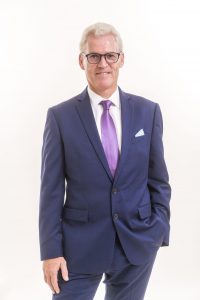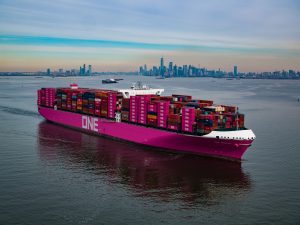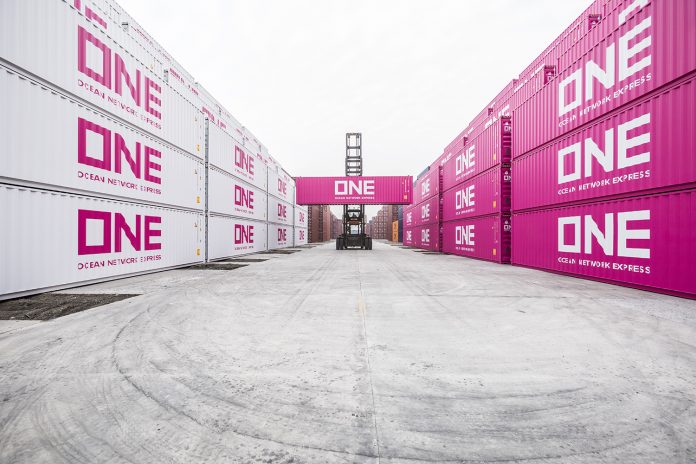Asian inventory levels have declined, including “very low” levels of stored food products which is fuelling the increase in European and US exports to Asia according to Ocean Network Express (ONE) chief executive officer (CEO) Jeremy Nixon.
In an interview with Container News, Nixon said demand in Japan, China, India and Taiwan has increased and with the void sailings out of Asia there is a substantial decrease in capacity on the return leg also, and this has pushed up rates as a consequence.

Backhaul volumes westbound from the US have risen substantially since March when the return leg rates sank to US$343/FEU, according to the Freightos Baltic Index (FBX). On the 4 May the same rates stood at US$484/FEU, a more than 40% increase on late March rates.
On the North Europe to Asia trades the increase since 1 March has been even more pronounced with rates standing at US$1,424/FEU, from US$690/FEU. While from the Mediterranean rates surged from US$455/FEU to US$925/FEU in the same period, according to the FBX.
Nixon said that “both dry and reefer cargo had seen rate increases due to the enforced blanking of sailings.”
He went on to say that operational cost savings due to the reduced services would also result in decreased revenues for the major container lines, on their headhaul trades, as a result of the Covid-19 crisis. Nixon estimated that the container volumes over the coming month would be around 20% lower as the Golden Week holidays during the first week of May will also affect volumes with Ramadan also having an effect, “but it’s too early to say what will happen in June,” he added.
Full year earnings for the ONE triumvirate, MOL, NYK and K Line, saw the lines return a healthy US$105 million profit for the full year 2019, ended on 31 March, a substantial improvement on the US$586 million loss for the previous year.
In looking at the immediate future Nixon agreed that the lines would make some savings on operational expenses, but “we have the same fixed costs in offices and overheads such as ships and the container fleet,” he said.
In the forecasting section of its full year 2019 results the line said the, “Global economy is rapidly deteriorating due to epidemic expansion, which is seriously impacting the global supply chain. Demand is declining in large consumption regions such as Europe, North America, and many other locations, and we have executed a considerable scale of void sailings in April. Uncertainties are still increasing for the situation after May.”
Nixon admitted that making forecasts was difficult due to the economic dynamics, probably for the rest of this year, “It’s an unusual situation that the industry finds itself in,” explained Nixon. He added, “We are where we are and we have to manage what’s in front of us, but our IT systems are working well, our cloud based systems that many customers are moving to are working well and we have strong cash reserves.”
For Nixon the importance of being nimble, “to react to the needs of the customer,” is critical while the operator will also “adjust capacity in line with demand,” and that will “prevent additional opex,” he said.
According to the ONE CEO the broader maritime industry is “doing a good job of keeping the lights on, keeping trade going,” in what are extremely difficult circumstances. He paid tribute to the port workers, truckers and crew and said the company is working hard to make sure these workers are given the key worker status that they deserve.

“We are working with the G20 states, the United Nations, the International Chamber of Shipping (ICS) and others because it is critical that vessels are allowed to operate efficiently, there is a need to repatriate crew who’ve been working on these ships for a long time,” explained Nixon.
ICS is spearheading an initiative that will define a protocol for the safe transfer of crew, “We need to define guidelines that we can all work to,” Nixon said. He revealed that the maritime industry, including the World Shipping Council, ICS and trade unions are working with airlines and airports to develop safe systems, “yes we are close,” to an agreement, Nixon revealed, “but it’s a delicate matter,” he added.
“We are working geography by geography in working groups to support seafarers,” he said.
Nick Savvides
Managing Editor







